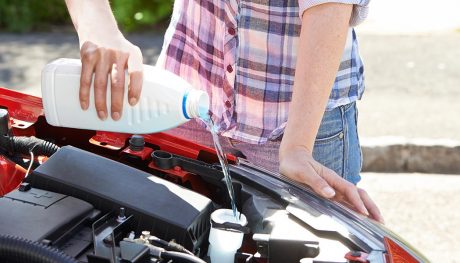
Let’s go over some simple and inexpensive things you can do to prevent summer car problems from happening.
Avoiding Common Car Problems in the Summer
Summer Car Problems Don’t Have to be an Issue
Summer is here, and the extreme heat will put extreme stress on your car. Can your vehicle take the abuse without any help from you? If the answer is no, you might end up with a very expensive repair. So, let’s go over some simple and inexpensive things you can do to prevent summer car problems from happening.
Comfort Items, Like the Cabin Filter, Matter
A lot of newer vehicles have an air filter for the air conditioning and heating system, just like your house has an HVAC filter. It has to be replaced on a regular basis, but when?
As summer begins, spring ends, and with it comes pollen, dust, mold and everything else that causes allergies. All that stuff is embedded in your car’s cabin filter, and you are driving around with it. That’s not good if you have allergies. The cabin filter is not expensive, but it’s usually located in an inconvenient place to access. Learning how to change it will give you a feeling of accomplishment, and clean, fresh, filtered air to breathe while driving.
Maintain Your Air Conditioner
Is your air conditioner not cooling as well as it did last summer? Don’t wait until it gets worse before spending money on repairing it. Waiting will let a simple, inexpensive service evolve into a major, expensive repair.
Most people understand that air conditioners run on refrigerant, which is commonly referred to as freon, and they understand that freon slowly leaks out and must be ‘topped off’ every now and then. But what they don’t know is that the refrigerant carries an oil in suspension, a special oil that lubricates the very expensive compressor. As freon seeps out, ever so slowly, it takes the compressor’s life-saving oil with it. If all you do is replace the lost freon, you will leave the compressor unprotected.
Have a qualified professional service your car’s air conditioner correctly. Spend a little now, or you will have to pay a lot later, probably in the middle of the hot summer.
Traveling This Summer? Start with the Glove Box
Paper road maps are great when you need a larger area view than what your GPS can provide. A GPS can also cease functioning at the worst times; maps don’t.
Throw in a prepaid cell phone, spare money for emergencies, change for toll roads, a flashlight, and a two-day supply of any critical medicines that you take. It sounds simple now, but if you need these things on the road and don’t have them, it’s a big deal.
Stock Your Trunk
Everybody carries jumper cables, right? What, you don’t have them? You should invest in a good set of heavy-gauge copper cables. They should be as long as two car widths; that’s 16 feet with a little working room to spare. Why should the jumper cables be so long? Because your battery will always be on the opposite side of the car as the one that is jumping you off.
If your car is like most others on the road, its spare tire is severely under-inflated. Perhaps it’s even dry rotted and has shed big chunks of its tread, which has made it is unusable. While you are inspecting the spare, and possibly buying a new one (they don’t last forever) make sure the jack works. Apply some oil to the threads and perhaps buy a better quality lug wrench than the toy one that came with the car.
If you’ve ever knelt at the side of a road changing a spare tire you might have promised yourself that you would buy some knee pads. Now is a good time to keep that promise. Knee pads protect your knees, and your expensive dress or slacks. Buy some work gloves too and stow them, along with a spare rag, inside the trunk.
When Are Tires Most Likely to Have Flats?
About 80% of the problems you will have with tires will occur within the last 20% of their lives. A word to the wise: if you are going to travel far from home, on long lonesome highways, don’t try to squeeze the last little bit of life out of your tires. Shop for a new set now.
Wiper Blades
Are you ready for summer thunderstorms? Your wipers are probably shredded from ice, frost, and snow over the winter. Enough said.
Overheating
Overheating is the probably the biggest mechanical threat from the engine. Coolant slowly seeps out, or gets used internally by the engine, and when it gets low enough the engine will overheat. When will it most likely overheat? Not when it’s parked in your driveway.
Hoses seep at their connections. Gaskets seep. Thermostats get old and will one day stick closed, and will rapidly overheat the engine. None of those parts lasts forever, and none are extremely expensive. Learn how to check hoses and belts (bad problems are easy to identify, whereas smaller issues are not so easy to detect), or simply learn how to read an odometer. When a vehicle nears 100,000 miles it is a good idea to have a professional check over the entire cooling system.
Check Your Battery
Yes, you might be driving around with a battery that is almost dead. How much reserve power does your battery have in case you leave your lights on? It’s always a gamble with an old battery.
You can have your battery tested at a parts store. Have the battery cable ends cleaned and reinstalled tightly. Loose cable ends are a primary cause of corrosion, and the resulting no-starts.
Fuel System Problems
Ever notice that major mechanical problems don’t happen on the road? Cars stop running because of ‘soft part’ failures. This means that parts that should be replaced on a regular basis are left overdue for replacements.
Think of parts like the fuel filter: it’s small, inexpensive, and easy to replace in most cases. However, it is typically ignored until it clogs up at highway speeds. Have it replaced now before your next big trip.
Check Exterior Lights
When’s the last time you check all of your exterior lights? Don’t answer that because the answer is usually ‘never,’ so now is a good time.
Build an Emergency Kit
You should always make sure you have an emergency kit in your car. A few bottles of water or sports drinks, some energy bars, rain ponchos, a signaling mirror, and a few basic first aid supplies. Get it all together now and stow it in the trunk. Hopefully you won’t need it, but that’s not the point. If you do need it, you’ll be glad you prepared in advance.





